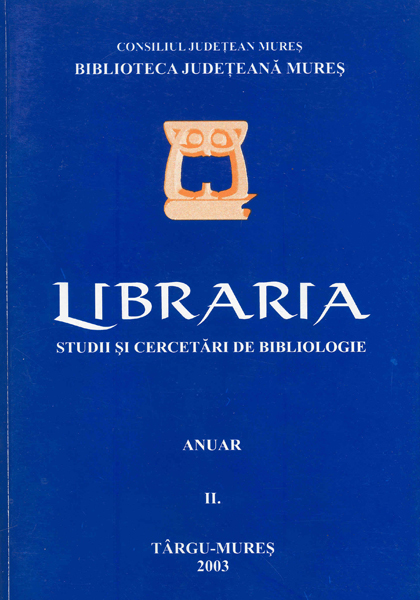Augustin Bunea – un istoric exemplar
Augustin Bunea – An Exemplar Historian
Profiles
Author(s): Corina TeodorSubject(s): History, Essay|Book Review |Scientific Life
Published by: Biblioteca Județeană Mureș
Keywords: Libraria; Biblioteca Județeană Mureș; biblioteconomie; bibliologie; carte veche; carte bibliofilă; istorie locală; servicii de bibliotecă; Biblioteca Teleki; carte veche românească;
Summary/Abstract: A discussion about the works of the greatest Greek-Catholic historianAugustin Bunea is always necessary. The reason is quite simple if we followsome directions, in order to: 1) include his entire work in the historiographicalproduction of his age; 2) emphasize his role in initiating the dialogue betweenecclesiastical historiography and the laical one; 3) see his work through the eyesof his Greek-Catholic and also Orthodox contemporaries.His work belongs to the so-called period of Transylvanian ecclesiasticalhistoriography triumph (1870-1910) and we may divide it into several majorthemes.First of all, Bunea was interested in ecclesiastical controverses thatrefered to the existence of a Transylvanian metropolitan seat during the MiddleAge. The „historiographical fight” was between Bunea, who dennied theexistence of such an authority, and Vasile Mangra, the eminent Orthodoxhierarch, who contradicted him. But their controverse had no finality.Bunea was also interested in monographies and biographies. In fact, he isconsidered to be the one who imposed monography in Greek-Catholichistoriography.The history of the 18th century was another theme that interested him;more than that, he always considered that ecclesiastical historiography is partof general history. We also have to mention that he understood ecclesiasticalhistory as a whole; he did not divide it into Greek-Catholic and OrthodoxChurch history, but combined them, giving us the real image of Transylvaniansociety.The begining of the 20th century emphasized a new tendency inhistoriography: the reconciliation and probable Bunea’ s death (1909) had itscontribution in this way. That is because his entire work was in the same timeappreciated by Greek-Catholic and Orthodox historians and his funeralsrepresented a reunion of all historians of his time.
Journal: Libraria. Studii și cercetări de bibliologie
- Issue Year: II/2003
- Issue No: 2
- Page Range: 113-121
- Page Count: 9
- Language: Romanian

